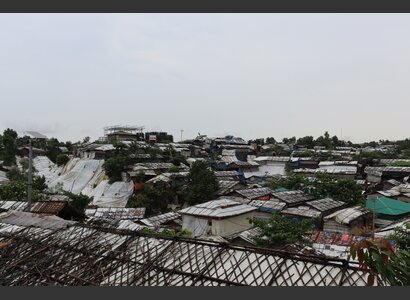More than one million Rohingya live in precarious conditions in the camps of Cox's Bazar – the world's largest refugee camp in Bangladesh. Their daily lives are marked by a lack of prospects. They suffer from malnutrition, inadequate health care, and drastic cuts in international cooperation. This is an appeal against forgetting their plight.
August 25, 2025, marks the eighth anniversary of the Rohingya's arrival in Bangladesh. Over a million people live in a total of 34 camps in cramped conditions and under precarious circumstances. Helvetas, the Swiss organization for development cooperation and humanitarian aid, has been supporting these people for eight years and remains onsite to enable them to live as dignified and self-determined a life as possible. The world must not forget the suffering of the Rohingya.
The humanitarian crisis in the camps is growing: In the past 18 months, around 150,000 more Rohingya have arrived in the camps, but international support has not been sufficiently expanded. Global cuts in development cooperation are exacerbating food insecurity and making it difficult to provide reliable health care.
A safe return for the Rohingya remains virtually inconceivable. At the same time, violence between different groups and gangs in the camps has increased noticeably over the past year, posing an additional threat to the refugees.
Food insecurity and monsoon season exacerbate the situation
Most Rohingya remain completely dependent on humanitarian aid to ensure their daily survival – without the possibility of building a sustainable livelihood. The food situation is particularly alarming: The increasing demand for food cannot be met – partly because international support has been cut.
In addition, the current monsoon season is hitting people hard. Heavy rains have caused flooding, landslides and severe destruction in Cox's Bazar over the past three months. More than 1,900 shelters have been damaged, and waterborne diseases may spread. Children in particular are suffering from the deteriorating hygienic conditions.
Helvetas supported more than 38,000 households last year
The Swiss NGO Helvetas supports both the Rohingya and the families of the host community – in the last twelve months, it has helped 30,600 households in the camps and 8,200 local families in the surrounding communities. One focus was on food security: Helvetas is helping families, for example, with new farming techniques so that they can combat malnutrition, even in confined spaces.
Helvetas is working with the Rohingya in the camps to improve infrastructure, for example by building sewage systems. To this end, the NGO relies on cash-for-work projects in which the Rohingya are compensated for their work. Helvetas also specifically promotes the safety and economic independence of women.


